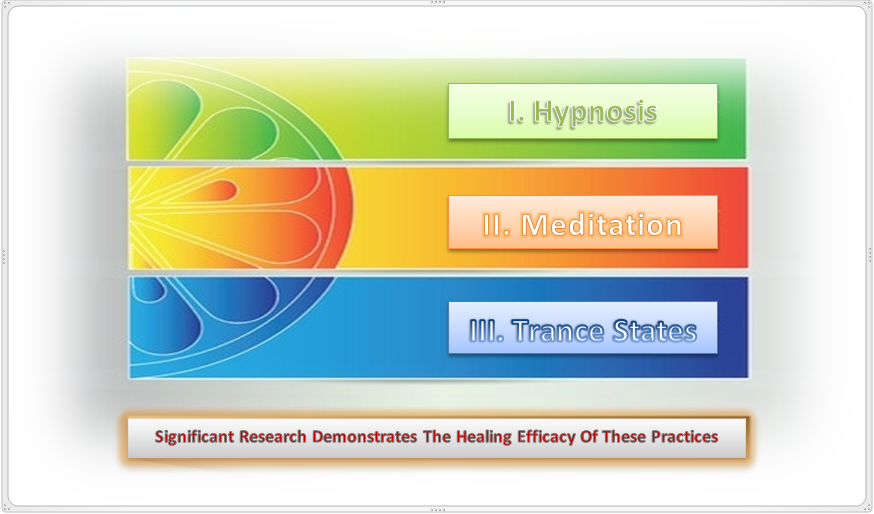A REVIEW OF THE SIGNIFICANT RESEARCH ON HYPNOSIS, MEDITATION & TRANCE STATE HEALING
I. HYPNOSIS
Numerous scientific studies have been published confirming clinical hypnosis as a viable and effective intervention for alleviating chronic pain with cancer and a variety of other conditions (see Hypnosis In Contemporary Medicine, Mayo Clinic Proceedings here). These randomized and controlled studies, along with medical reports, reviews, and a sizable amount of literature in the fields of health and alternative medicine, indicate the complimentary benefits of hypnosis in facilitating healing by countering stress, enhancing immune system responses, and empowering patients to actively participate in their wellness process.
Hypnosis has had a controversial history in psychology, psychiatry and neurology. For over 100 years researchers have debated if a special hypnotic state exists or whether it is just about using cognitive strategies and mental imagery in a normal waking state. However, a 2011 study conducted by a group of multidisciplinary researchers from Finland established evidence for the existence of the hypnotic state. The researchers used high-resolution eye-tracking methodology and presented a set of well-established oculomotor tasks that triggered automatic eye behavior. They found objectively measurable changes in automatic, reflexive eye behavior that could not be imitated by non-hypnotized participants (see article and study information provided by the Academy Of Finland here).
A. Hypnosis For Smoking Cessation
 Research evidence shows that hypnosis is far superior to nicotine patches and drugs such as Chantix for helping individuals quit smoking. Many people have successfully stopped smoking as a result of utilizing hypnosis, including celebrities such as Matt Damon and Charlize Theron.
Research evidence shows that hypnosis is far superior to nicotine patches and drugs such as Chantix for helping individuals quit smoking. Many people have successfully stopped smoking as a result of utilizing hypnosis, including celebrities such as Matt Damon and Charlize Theron.
1. Research Evidence On Hypnosis & Smoking Cessation
a. A study of 71 smokers showed that after a two-year follow up, patients that quit with hypnosis were twice as likely to remain smoke-free than those who quit on their own. (Guided health imagery for smoking cessation and long-term abstinence. Wynd, C. A. Journal of Nursing Scholarship, 2005; 37:3, pages 245-250.)
b. A field study of 93 male and 93 female CMHC outpatients examined the facilitation of smoking cessation by using hypnosis. At 3-month follow-up, 86% of the men and 87% of the women reported continued abstinence from the use of tobacco using hypnosis. Performance by gender in a stop-smoking program combining hypnosis and aversion. (Johnson D. L., Karkut R. T. Adkar Associates, Inc., Bloomington, Indiana. Psychol Rep. 1994 Oct;75(2):851-7. PMID: 7862796 [PubMed – indexed for MEDLINE])
c. Of 43 consecutive patients undergoing this treatment protocol, 39 reported remaining abstinent from tobacco use at follow-up (6 months to 3 years post-treatment). This represents a 90.6% success rate using hypnosis. (University of Washington School of Medicine, Depts. of Anesthesiology and Rehabilitation Medicine, Int J Clin Exp Hypn. 2001 Jul;49(3):257-66. Barber J.)
d. Thirty smokers enrolled in an HMO were referred by their primary physician for treatment. Twenty-one patients returned after an initial consultation and received hypnosis for smoking cessation. At the end of treatment, 81% of those patients reported that they had stopped smoking, and 48% reported abstinence at 12 months post-treatment. (Texas A&M University, System Health Science Center, College of Medicine, College Station, TX USA. Int J Clin Exp Hypn. 2004 Jan;52(1):73-81. Clinical hypnosis for smoking cessation: preliminary results of a three-session intervention. Elkins G. R., Rajab M. H.)
e. Hypnosis is the most effective way of giving up smoking, according to the largest ever scientific comparison of ways of breaking the habit. A meta-analysis, statistically combined results of more than 600 studies of 72,000 people from America and Europe to compare various methods of quitting. On average, hypnosis was over three times as effective as nicotine replacement methods and 15 times as effective as trying to quit alone. (University of Iowa, Journal of Applied Psychology, How One in Five Give Up Smoking. October 1992. Also New Scientist, October 10, 1992.)
B. Hypnosis & Weight Loss
 Weight loss requires integrating diet, proper nutrition, and exercise. In the long term, combining these basic elements or “lifestyle” choices have proven safe and successful in overcoming weight problems. Hypnosis alters emotional relationships with food and engenders the motivation necessary to embrace healthy lifestyle choices.
Weight loss requires integrating diet, proper nutrition, and exercise. In the long term, combining these basic elements or “lifestyle” choices have proven safe and successful in overcoming weight problems. Hypnosis alters emotional relationships with food and engenders the motivation necessary to embrace healthy lifestyle choices.
1. Research Evidence On Hypnosis & Weight Loss
a. A study investigated the effects of hypnosis in weight loss for 60 females, at least 20% overweight. Treatment included group hypnosis with metaphors for ego-strengthening, decision making and motivation, ideomotor exploration in individual hypnosis, and group hypnosis with maintenance suggestions. Hypnosis was more effective than a control group: an average of 17 lbs lost by the hypnosis group vs. an average of 0.5 lbs lost by the control group, on follow-up. (Cochrane, Gordon, Friesen, J. (1986). Hypnotherapy in weight loss treatment. J Consult Clin Psych., 54, 489-492)
b. 109 people completed a behavioral treatment for weight management either with or without the addition of hypnosis. At the end of the 9-week program, both interventions resulted in significant weight reduction. At 8-month and 2-year follow-ups, the hypnosis subjects were found to have continued to lose significant weight, while those in the ‘behavioral treatment only’ group showed little further change. (J Consult Clin Psychol. 1985)
c. Researchers analyzed 18 studies comparing cognitive behavioral therapy such as relaxation training, guided imagery, self monitoring, or goal setting with the same therapy supplemented by hypnosis. Those who received the hypnosis lost more weight than 90 percent of those not receiving hypnosis and maintained the weight loss two years after treatment ended. (University of Connecticut, Storrs Allison DB, Faith MS. Hypnosis as an adjunct to cognitive-behavioral psychotherapy for obesity: a meta-analytic reappraisal. J Consult Clin Psychol. 1996;64(3):513-516)
C. Hypnosis For Cancer, Pain & Stress
 Hypnosis facilitates health by countering stress, especially maladaptive physiological responses to distress described by Hans Selye as “generalized adaptation syndrome” in his landmark 1975 work on stress. Hypnosis augments relaxation and both evokes and enhances beneficial immune system responses, according to an ocean of literature on the science of psychoneuroimmunology.
Hypnosis facilitates health by countering stress, especially maladaptive physiological responses to distress described by Hans Selye as “generalized adaptation syndrome” in his landmark 1975 work on stress. Hypnosis augments relaxation and both evokes and enhances beneficial immune system responses, according to an ocean of literature on the science of psychoneuroimmunology.
1. Research Evidence On Hypnosis & The Immune System
During the past three decades, many published case studies have linked stress and/or depression with immunological deficits in both animals and humans. However, over the past two decades there has been an increasing number of randomized, controlled studies that indicate it is indeed possible to alter certain immune system responses through hypnosis and similar mind/body techniques. This growing flied suggests multiple uses and benefits of hypnosis. Many studies have reviewed the psychoneuroimmunological implications of emotions and cancer progression and reported that helplessness and poor coping are associated with lower cancer survival rates. Relaxation techniques and hypnosis are health promoting strategies that can counter the experience of helplessness, enhance patients’ active participation in care, and potentially augment immunological strength. (Hall, H. 1982, Hypnosis and the immune system: A review with implications for cancer and the psychology of healing, Amer J. Clin Hypn 2592-3):92-103 and Levitan, A. 1991, Hypnosis in the 1990’s and beyond, Amer J Clin Hypn 33(3): 141-149.)
2. Research Evidence On Hypnosis For Cancer & Nausea
The benefits of hypnosis as an adjunct therapy for the pain and nausea associated with cancer and its treatment has been convincingly demonstrated. Several controlled studies have found hypnosis to be helpful for nausea caused by cancer and chemotherapy used to treat it, as well as the pain caused by the disease itself. (Three studies: Cotanch, P., Hockenberry, M., Herman, S., 1985, Self-hypnosis as antiemetric therapy in children receiving chemotherapy, Oncol Nurs Forum, 12:41-46; Hockenberry, M. J. & Cotanch, P. H., 1985, Hypnosis as adjuvant antiemetric therapy in childhood cancer, Nur Clinc North Am., 20: 105-107; Syrjala, K. L., Cummings, C., Donaldson, G. W., 1992, Hypnosis or cognitive behavioral training for the reduction of pain and nausea during cancer treatment: A controlled clinical trial, PAIN, 48: 137-146.)
3. Research Evidence On Hypnosis For Cancer & Pain Control
a. A brief presurgery hypnosis intervention was effective in managing patients’ postsurgical pain and distress after excision breast biopsy. The intervention was also effective in reducing distress prior to surgery, a time of heightened distress for most women. Based on these results, it would appear that hypnosis has a strong beneficial impact for women undergoing excisional breast biopsies and should possible be more widely implemented as part of standard clinical care. (Montgomery, G. H., Weltz, C. R., and Bovbjer, D. H., Jan., 2002, Brief presurgery hypnosis reduces distress and pain in excisional biopsy patients, Int J. Clin Exp Hypn, 50(1): 17-32)
b. The National Institute of Health Technology Assessment Panel Report contains strong language about the efficacy of hypnosis for pain control. It judged hypnosis to be a “viable and effective intervention for alleviating pain with cancer and other chronic pain conditions,” according to a July, 2001 report in Scientific American.  The actual NIH Panel report published in JAMA stated: “The Panel found strong evidence for the use of relaxation techniques in reducing chronic pain in a variety of medical conditions as well as strong evidence for the use of hypnosis in alleviating pain associated with cancer.” (NIH Technology Assessment Panel on Integration of Behavioral and Relaxation Approaches into Treatment of Chronic Pain and Insomnia, 1996, JAMA, 276(4): 313-318)
The actual NIH Panel report published in JAMA stated: “The Panel found strong evidence for the use of relaxation techniques in reducing chronic pain in a variety of medical conditions as well as strong evidence for the use of hypnosis in alleviating pain associated with cancer.” (NIH Technology Assessment Panel on Integration of Behavioral and Relaxation Approaches into Treatment of Chronic Pain and Insomnia, 1996, JAMA, 276(4): 313-318)
4. Research Evidence On Hypnosis For Reduction Of Pain & Anxiety
a. A review of seven studies since 1980 looking at the effectiveness of hypnosis in reducing anxiety in cancer patients revealed that: “Hypnosis interventions were found to be of significant help in reducing anxiety in six of seven studies examining this variable and all seven reported a significant reduction in the pain experience by the patient.” (Genuis, M. L., April 1995, The use of hypnosis in helping cancer patients control anxiety, pain and emesis: a review of recent empirical studies, Amer J Clin Hypn 37(4): 322)
b. Hypnosis “augments and complements other pain therapies nicely,” and patients suffering from cancer are “ideally suited” for the use of hypnosis for several reasons, stated David L. Handel, M.D. in an issue of the publication, Texas Magazine. Dr. Handel points out that patients with chronic conditions feel out of control and “live in a state of perpetual tension; they struggle with concept of self-relaxation.” Dr. Handel goes on to say that hypnosis is an answer for these people because it is accompanied by profound relaxation and has been shown to be helpful in managing pain. (Handel, D. L., February, 2001, Complementary therapies for cancer patients: what works, what doesn’t, and how to tell the difference, Symposium on “Cancer: What Primary Physicians Need To Know” in Texas Magazine, 58-73)
II. MEDITATION
There are hundreds of published studies showing the effects of meditation in rewiring the brain for tranquility, happiness, and positive feelings. Research on the brains of meditation subjects has documented neuron growth in the hippocampus—which involves learning, memory, and emotional control—and the right anterior insula, believed to involve awareness. Researchers from the University of Wisconsin working with Tibetan monks found that meditation causes intense activity in the prefrontal cortex of the brain, while studies using MRIs have recorded change in other brain areas including increases in brain-signaling connections with subjects who had meditated daily for a period of only eight weeks.

Studies show that meditation promotes brain plasticity which helps rewire your neural pathways for change.
There is a growing body of research demonstrating how meditation promotes brain plasticity (see MeditationResearch publication ‘Meditation & Neuroplasticity: Five Key Articles’ here). Studies on meditation subjects have documented neuron growth in areas of the brain involving learning, memory, awareness, and emotional control, including increases in neurotransmission recorded by MRIs.
The manner in which meditation biologically affects somatic, cognitive, and affective processes has become increasingly important in the areas of integrative medicine and holistic health. Research in neuroscience has shown enduring changes in baseline brain function—activity in response to specific emotional challenges—demonstrating brain plasticity and its effects on immune system function. (See Psychosomatic Medicine publication ‘Alterations in Brain and Immune Function Produced by Mindfulness Meditation’ here).
Indeed, over 1500 studies have been conducted by more than 250 independent research institutes showing meditation to be clinically effective for the management of stress, anxiety and panic, chronic pain, depression, obsessive thinking, strong emotional reactivity, and a wide array of medical and mental health related conditions. Medical outcomes of 15,000 patients from the Center for Mindfulness Stress Reduction at the University of Massachusetts’ Medical School shows a 35% reduction in the number of medical symptoms and a 40% reduction in psychological symptoms.
III. TRANCE STATES
A wide range of experimental laboratory research on shamanistic practices suggests an operative connection between trance states and healing. These trance states are dominated by slow wave patterns of discharge from parts of the brain including the limbic system, frontal cortex, and hippocampal area, which are optimal for energy, orienting, learning, memory, and attention. A review of eighty-seven parapsychological laboratory studies (see American Anthropological Association citation below) indicates that trance states such as meditation, hypnosis, induced relaxation, and sensory deprivation significantly improved extrasensory perception and psychokinetic performance. These studies also demonstrate that humans have the ability to affect and heal a variety of biological systems through psychokinesis.

Research demonstrates that a common physiology underlies altered states of consciousness induced by a variety of different procedures
Meditation disciplines value trance states as providing the basis for a more objective perception of reality. Yoga traditions indicate that healing and other psychic abilities are a by-product of spiritual development which involve direct and profound alterations of consciousness. A large body of research exists suggesting that trance state healing and well-being practices are psychobiologically based. The empirical evidence includes the universal nature of such practices, the psychobiological characteristics of trance states, and the functional relationships and association of trance with the abilities of healing and divination. (See ‘Shamans and Other Magico-Religious Healers: A Cross-Cultural Study of Their Origins,’ published on behalf of the American Anthropological Association [PDF], here).
If you have questions or wish to find out how Cathexis Therapeutic Imagery can benefit you, please call (818) 512-4371 or contact us.


